Conservatives Wrong on Auto Bailout?
Steve Benen argues that the bailout of the American automobile industry has produced excellent results, proving that conservatives who railed against the measure were wrong.
He cites Steven Rattner‘s WaPo op-ed, which notes that GM and Chrysler are both reporting modest profits, are selling cars for higher prices, and are running more efficient operations. Indeed, it’s even conceivable that we’ll not only see all the money that the Obama administration put into the companies paid back but realize a small profit.
Benen also cites a year-old Washington Monthly piece by Phillip Longman showing that government bailouts quite frequently achieve the desired result of saving major companies on the brink of bankrupcy.
So, what does this mean for conservative critics? Well, for those arguing that government couldn’t successfully revive the companies — at least in the short term — it means they were wrong. But that’s not what most of us were arguing.
Indeed, in a December 2008 post titled “Public Opposes Auto Bailout,” I frankly admitted that we were making this up as we went along and that none of us had a clue what the specific effects of any of the policy options on the table would be.
(And note that most of the OTB gang was in opposition to the bailouts in the fall of 2008 when President Bush was trying to get them through Congress and then did so via an end-around when Congress refused to pass it. So, our objection is ideological, not partisan or political.)
In my November 2008 post “Why Not Bail Out GM?” I argued that GM didn’t deserve to survive after decades of bad decisions. And I argued, rather obliquely perhaps, that using taxpayer money to reward GM’s bad behavior would come at the direct expense of those making cars in America the right way.
In December, Steve Verdon followed up with “Why the Bailouts are a Bad Idea.” It’s rather technical (he’s an economist by training) but the bottom line argument is one of moral hazard. That is, bailouts beget more bailouts and, more importantly, encourage foolish risk-taking.
None of those arguments have been disproved by the unfolding of facts.
And none of us were in favor of doing nothing, strictly speaking. That is, the expectation was that the natural course of events would have been for GM and Chrysler to go into bankruptcy — which would have shed that bad debt that Rattner cites as crucial to the success of the government plan — and have the best parts sold to the highest bidder. Whether that would have been “better” from the standpoint of the profit and loss sheets is unknowable.
It’s worth noting, too, that Rattner’s test of the success of the plan is an odd one. While it’s great that GM is making a “profit,” I’m not sure why we should care. The reason we wanted to save GM was to save the associated jobs. But a huge number of those — at the production facilities, dealerships, and associated industries — have been lost forever in the restructuring.
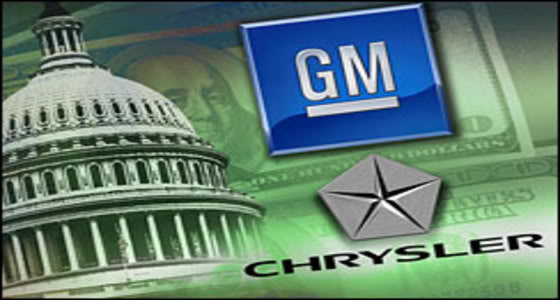


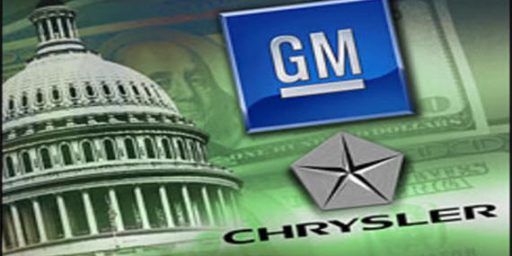
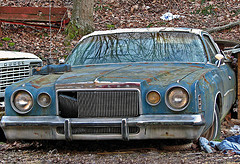
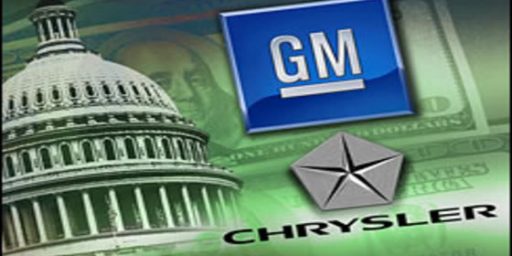
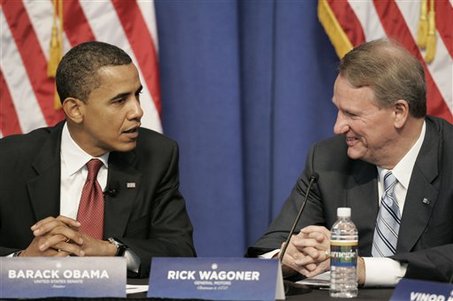
So it wasn’t the thin edge of the communist-nazi-fascist-muslim wedge? It wasn’t proof that Obama was on a clear path to becoming Stalin-Hitler-Mussolini-Voldemort? It wasn’t the end of America?
Huh.
Let’s see if we can assemble of short list of conservative hysterias:
Ending slavery
Going off the gold standard
Teaching evolution
Unions
The New Deal
Every government regulator ever
Social Security
Medicare
Civil rights
Ending prayer in schools
Women’s rights
Legal abortion
The minimum wage
Birth control
The Great Society
Sex education
Gay rights
And of course: black president and all his many perfidies
Some folks might conclude that we should simply ignore the Right. Because they are always wrong. About everything.
In fact, I bet you could make a graph showing the long history of conservative hysterias and the total lack of causation as relates to GDP or living standard or much of anything. Conservatives have predicted approximately 300 of the last zero apocalypses.
Meanwhile, of course, they managed to actually miss minor upsets like the complete meltdown of the financial system and housing market.
Worldwide there’s significantly more capacity for building automobiles than there is market for automobiles and capacity continues to grow. Every country, including China, wants to get into areas in which there are better margins than there are in apparel and commodity electronics. Autos manufactured in India are just starting to enter the American market. Within a year or so Chinese-manufacturer autos will enter the American market. Then Vietnamese. After that, who knows?
As this capacity grows, buoyed on waves of government subsidy, can we really believe that the domestic auto industry will return to being the engine of growth it was 40 or 50 years ago? I doubt it.
Bailing out GM and Chrysler may have made sense. Barely. But take a look at GM’s balance sheet over the last couple of decades, for goodness sake. Should we keep the company afloat indefinitely? Aren’t there better uses for $65 billion?
Sure, as long as you conveniently ignore the equity stolen from the rightful owners and handed over to the unions, the arm twisting of their creditors, skipping around perfectly functioning bankruptcy laws, and the huge debt remaining that is going to take more than a little happy armwaving to repay. And how soon do the taxpayers pick up the bill for their unfunded pension and healthcare liabilities?
Michael, I’m not sure how your response addresses the argument.
Most of us weren’t predicting any sort of short-term calamity from the bailout. Rather, we were arguing that it sends a bad message, that it’s propping up firms that deserved to fail, and so forth.
As to the various social changes that have been opposed over the years, many of them have indeed had negative consequences. Certainly, the New Deal and Great Society programs, while doubtless offering real benefits for some, have created massively costly entitlements that are now causing us major fiscal headaches.
Most of the things on your list are things that religiously-oriented conservatives opposed. And, certainly, the changes have drastically harmed the world from the standpoint of an orthodox view of Christianity. Not my problem, obviously, but I can certainly see how they’d think the results were calamitous.
I think 3 emotional imperatives drove the bailouts:
1) fear of the recession and job loss
2) fear of losing something “as American as GM”
3) fear of political blow-back from 1 and 2
The conservatives had a coherent theory of political economy, but it just spoke at the wrong level. Really, nobody was on that page.
This guy saying it paid, so it was a good idea, is just offering post-hoc justification. He’s not connecting to the original motivations either.
Although, amusingly, the polling was decidedly against the bailout. Indeed, as noted, the Bush bailout failed in Congress and Bush had to resort to misappropriating TARP money to do it anyway.
BTW, it’s always good to remember that the Bush and Obama administrations played a two-step on the bailout. Bush provided bridge funding with full knowledge that it put the bailout on Obama’s watch, and that he’d follow through.
The reasons Bush couldn’t draw the line and cut off funding were really the same that drove the final bailout. Americans just couldn’t stomach the loss of GM at that time and in those circumstances.
It’s really hard for me to accept those polls. They seem more like a discontent metric rather than a real policy indicator.
I guess I say that because I don’t see any outside the hard/libertarian right who really seemed willing to let it happen. For real. Sure, some talked the game, but no more GM? I don’t think voters were really ready for that.
Would voters have been happy seeing Toyota and Honda bid for the bones of GM?
Maybe congress just saw *that* discontent coming.
James:
the bottom line for me is that prophets of doom on the Right have had a remarkable
record of being wrong. Wrong with amazing consistency whether it’s the religious, nationa
security or economic wings. American politics has been dominated and I think warped by
conservatives crying wolf with great thundering jeremiads. And
they are never right.
At what point should one stop listening to prophets of doom with a perfect record of failure?
While I think it was the fear of loss jobs that was the biggest factor in bailing out GM, the fear of losing the American “institution” that was GM has always fascinated me more, for 2 main reasons.
1. Why does American-ness derive from a brand and product? Is this common in other countries? I’m sure Italians are proud of Ferraris, but are they to the point that they associate national identity with certain corporations? I realize that the big 3 auto companies–as figure heads for mid-century manufacturing–really did contribute a lot to creating the strongest economy in the world and a strong middle class. But confusing well known American corporations with a shared culture and history is befuddling.
2. Would America have the same response towards the idea of losing GM and Chrysler if we had a few hundred more years of history behind us? The big 3 auto companies have only been American institutions for 90 years or so (I realize of course that many of the companies were founded at the turn of the century, but they haven’t been ‘institutions’ for that long). Is our lack of a long history the cause of the silly concept of companies being so GD “American.”
Again, the jobs was the real issue, but this secondary issue always struck me as curious
Were conservatives wrong on the bailout? No. But they have often been wrong SINCE the bailout.
Michael,
Really? We’ve done bailouts time and again, will we do them again? Yes. Is that hysterical? If it is then I’d argue that next to you I’m the epitome of serene and calm. Is it going to be doom? No. Will it be gloom? Probably. Why the latter I don’t think that these bailouts are the best use of the money.
By the way, in my post that James’ links to neither Akerlof nor Romer are conservatives, is their article a great thundering jerimaid…, but the did happen to be right, we did repeat history.
Michael freely associates the word Conservative with everything he thinks is evil.
What else is there to say?
Perhaps. But the conservative plan – “let’s pour hundreds of billions into iraq” did not do much for me. I would rather spend the money at home.
Now if we could just find someone who would rather not spend the money at all, we’d have – well, nothing, really, because he won’t be in a position to buy votes and therefore will be rejected by the What’s In It For Me? Club (estimated membership: too damn many).
Steve:
If we’re “repeating history” we’re doing it at a rather long interval, don’t you think? We didn’t bail out Enron or Arthur Anderson or various other companies that were in trouble. So if we’re on a slippery slope it seems to be only very moderately slippery or slopey. In fact the bail out thing seems to be something we do occasionally, from time to time, and to generally good effect.
Why don’t you start off by telling me which of the things I free-associated was not a conservative stand? I rattled off a list, so why don’t you point to the places where I wrongly associated a stand with conservatism.
Bailouts under normal circumstances make little sense. When the financial system is on the edge of an abyss, it is important to understand the psychological impact of a large failures.
Steve
Michael, to begin with, you initially claim those are all conservative hysterias. Now they are just conservative stands.
I thought about doing a point by point refutation but decided instead not to wrestle in the mud with you. It is late, I am tired, and you are delusional.
I get bored re-using words. I’m a writer not a programmer.
But let’s refine the issue: show me which of those issues did not cause an outpouring of conservative fear-mongering and hysteria. Each has been touted as evidence of a descent into an immorality-fueled national decline, or an attack on liberty, or the thin edge of some communist wedge.
Would just like to say;
This here post is why I enjoy your blog and keep it on my daily read list (via Google Reader). I am quite the liberal myself, but OTB’s writers are fair-minded, thoughtful and gracious and honest when wrong. I appreciate that.
I very much enjoy, please keep up the good work.
Nate